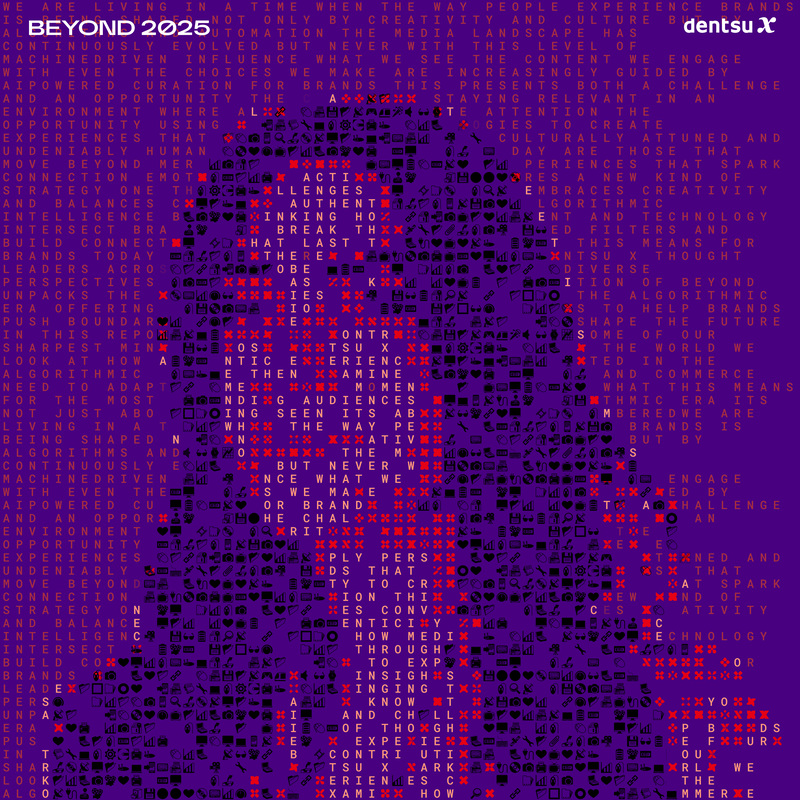This blog is inspired by dentsu’s Beyond 2025: Winning in the Algorithmic Era, a global thought leadership series exploring how brands can navigate a future shaped by AI, automation, and always-on algorithms.

As digital experiences become more automated, powered by advanced algorithms that promise hyper-personalization, a countertrend is emerging, particularly among Gen Z. Instead of embracing frictionless, algorithm-driven interactions, younger audiences are seeking more intentional, meaningful engagement.
Why Gen Z Is Rejecting Hyper-Personalization
Hyper-personalization, where algorithms tailor content and experiences based on individual data, has become a cornerstone of modern marketing. From personalized product recommendations to targeted ads, brands have relied heavily on technology to streamline and optimize customer experiences. However, many Gen Z consumers are rejecting this hyper-personalized approach, prioritizing control over their data and seeking experiences that empower them.
This desire for greater authenticity is central to their rejection of hyper-personalization with a dentsu survey showing that 81% of Gen Z want brands to be more authentic. Hyper-personalization often leads to predictable content that removes the sense of discovery and excitement. What was once an opportunity to surprise and delight has become a mechanical process driven by data rather than creativity.
The Appeal of Friction and Intentionality
So, why are Gen Z consumers increasingly drawn to friction instead of seamless, AI-driven interactions? In a fast-paced, always-on digital world, Gen Z is seeking opportunities to slow down and engage with brands in more intentional ways, favoring experiences that feel organic and authentic.
Social media platforms like TikTok and Instagram are responding to this shift by promoting longer, more thoughtful content, such as personal stories, educational deep-dives, behind-the-scenes insights, and DIY tutorials, rather than quick, viral, algorithm-driven posts.
Content creators are key to this evolution, producing authentic and relatable content that often bypasses traditional advertising. With 57% of Gen Z more likely to purchase a product or service recommended by an admired influencer, brand collaborations with content creators foster trust and align with Gen Z’s desire for genuine, unfiltered experiences.
Creating Opportunities for Deeper, More Deliberate Engagement
To effectively connect with Gen Z, brands must shift away from the relentless pursuit of hyper-personalization and frictionless experiences. Instead, brands should focus on creating experiences that foster authentic, deliberate, and meaningful interactions. Here are some practical strategies that can help brands refine their approach.
1. Embrace Authenticity and Transparency
In a world saturated with polished content, Gen Z is more drawn to brands that feel genuine and transparent. They value honesty, even when it comes to a brand's flaws or missteps. For example, sustainability-focused industries often benefit by showcasing the authenticity of their efforts. Companies in these sectors that provide clear, behind-the-scenes insights into their sourcing, manufacturing processes, and environmental impact establish credibility with Gen Z. Transparency regarding challenges and areas for improvement, such as addressing sustainability issues in production or packaging, also resonates with this generation, as it demonstrates a commitment to continuous progress and ethical responsibility.
2. Encourage Active Participation
Rather than relying solely on algorithms to suggest products or services, brands should empower Gen Z to actively shape their own experiences. Interactive campaigns, co-creation opportunities, and user-generated content allow Gen Z to actively participate as collaborators. For example, apparel brands frequently invite their consumers to participate in design challenges or vote on new product lines where the audience has a direct impact on the final product. This kind of co-creation makes Gen Z feel involved in shaping the brand experience.
3. Provide Opportunities for Slow Engagement
Brands can create opportunities for slow engagement through interactive, live-streamed events or webinars on topics important to Gen Z. Financial services are increasingly using educational webinars and interactive Q&A sessions to provide younger audiences with important knowledge on personal finance, savings and investing. By fostering slow, intentional engagement through educational content, these industries connect on a deeper level, allowing Gen Z to absorb information at their own pace rather than pushing them toward quick, transactional interactions.
In an AI-driven world where digital experiences are becoming increasingly automated, brands must recognize that younger consumers are seeking something more than quick, hyper-personalized interactions. They are yearning for deeper, more intentional engagement that feels authentic and empowering. By embracing strategies that prioritize authenticity, creativity, and engagement, brands can foster more meaningful relationships with Gen Z and stand out in an increasingly automated digital landscape. In doing so, they can move beyond the algorithm and create brand experiences that resonate on a deeper level.
To explore more trends and brand implications, download Beyond 2025: Winning in the Algorithmic Era.

